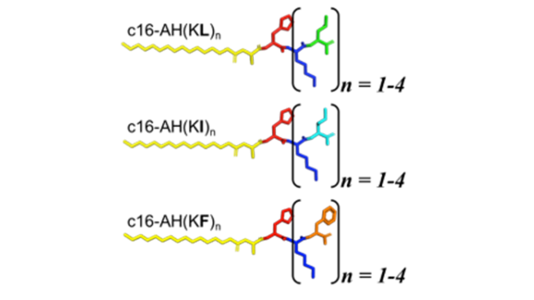
Scientific Achievement
A series of peptide amphiphiles that assemble into one-dimensional nanostructures was explored. Determinations were made on how the length of the peptide sequence and the identity of the hydrophobic amino acid impact the heme binding affinity, heme density, and the electronic properties.
Significance and Impact
The results are applicable to the design of 1D peptide assemblies reminiscent of natural structures. Such structures would have potential utility as supramolecular bioelectronic materials useful in biomedical sensing and as enzymatic materials.
Research Details
With sequence length of n = 2, the peptide assembly yielded the greatest binding affinity. The resulting nanoscale assemblies produced ordered arrays of the redox active molecule heme.
Work was performed at the Center for Nanoscale Materials.
DOI: 10.1039/D2NR00473A
About Argonne’s Center for Nanoscale Materials
The Center for Nanoscale Materials is one of the five DOE Nanoscale Science Research Centers, premier national user facilities for interdisciplinary research at the nanoscale supported by the DOE Office of Science. Together the NSRCs comprise a suite of complementary facilities that provide researchers with state-of-the-art capabilities to fabricate, process, characterize and model nanoscale materials, and constitute the largest infrastructure investment of the National Nanotechnology Initiative. The NSRCs are located at DOE’s Argonne, Brookhaven, Lawrence Berkeley, Oak Ridge, Sandia and Los Alamos National Laboratories. For more information about the DOE NSRCs, please visit https://science.osti.gov/User-Facilities/User-Facilities-at-a-Glance.
Argonne National Laboratory seeks solutions to pressing national problems in science and technology. The nation’s first national laboratory, Argonne conducts leading-edge basic and applied scientific research in virtually every scientific discipline. Argonne researchers work closely with researchers from hundreds of companies, universities, and federal, state and municipal agencies to help them solve their specific problems, advance America’s scientific leadership and prepare the nation for a better future. With employees from more than 60 nations, Argonne is managed by UChicago Argonne, LLC for the U.S. Department of Energy’s Office of Science.
The U.S. Department of Energy’s Office of Science is the single largest supporter of basic research in the physical sciences in the United States and is working to address some of the most pressing challenges of our time. For more information, visit https://energy.gov/science.